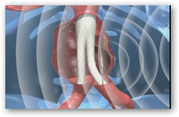The official name of the product is the EndoSure Wireless AAA Pressure Management System from Cardiomems and it doesn’t require a battery. The radiofrequency from the “magic  wand” does the power portion. It is currently in clinical trials. This is a permanent devices that comes to live with you.
wand” does the power portion. It is currently in clinical trials. This is a permanent devices that comes to live with you.
From the website:
“The EndoSure Wireless Pressure Measurement System is composed of two components: a miniaturized, wireless implantable sensor and an external electronics module. The external electronics module wirelessly communicates with our sensors to deliver vital patient data. Our wireless sensors are powered by RF energy delivered by an external electronics module and transmit real-time data without batteries.
The EndoSure sensor is approximately the size of a paperclip. It is a hermetically sealed circuit, encapsulated in fused silica and silicone, and is surrounded by a PTFE-coated nickel-titanium wire. Inside the fused silica is a micron scale cavity. Changes to the membrane of this cavity result in changes to the sensor's resonant frequency. These changes correlate to pressure changes. The sensor contains no batteries or internal power source, but is instead powered by RF-energy provided by a proprietary electronic antenna.”
The implant is the size of a paper clip but does a lot more with providing data for mean pressure, systolic pressure, diastolic pressure, heart rate and cardiac output. It is a sealed circuit, encapsulated in fused silica and silicone, and is surrounded by a PTFE-coated nickel-titanium wire.
This is a bit different than some of the other technology we have been reading about and who knows down the road perhaps with every stent a data device might soon the partner for the sensing portion, after the surgery. BD
The device is no bigger than a paper clip, but it could have an enormous impact for the 1.1 million Americans hospitalized each year with heart failure. Those hospital trips add up to a bill of more than $18 billion annually, according to the American Heart Association.
A study released today by researchers at The Ohio State University found that patients who receive the implant experienced 38 percent fewer hospitalizations in the first year, a huge number in the medical world.
Study Shows Heart Pressure Monitoring Reduces Hospitalizations for Heart Failure - ABC News





0 comments :
Post a Comment